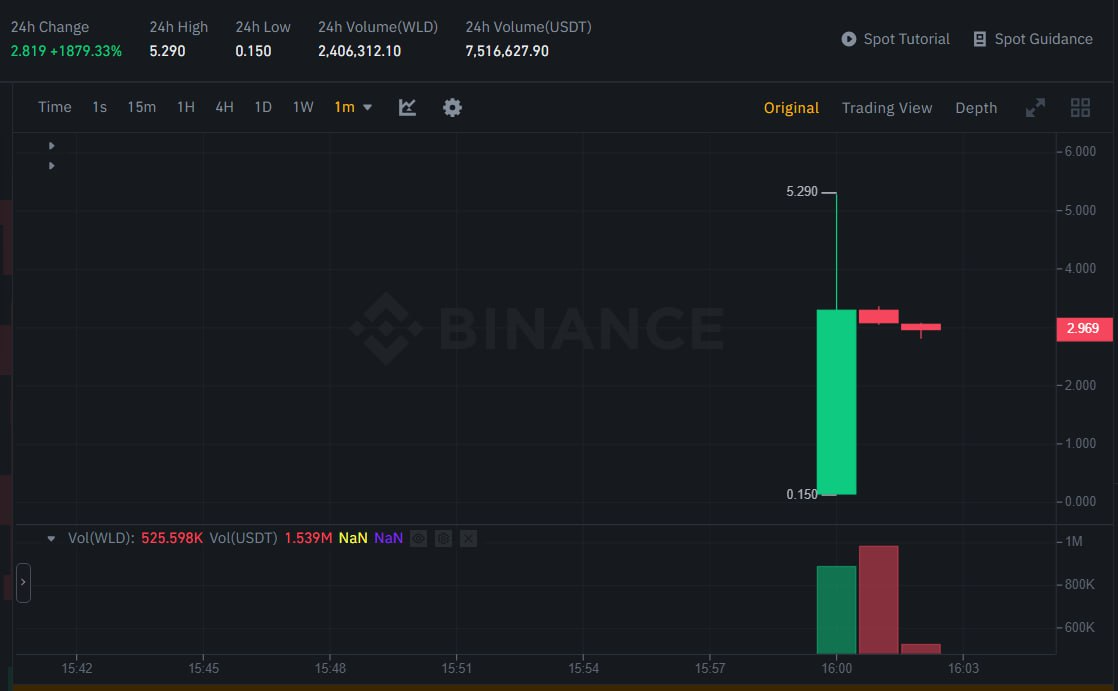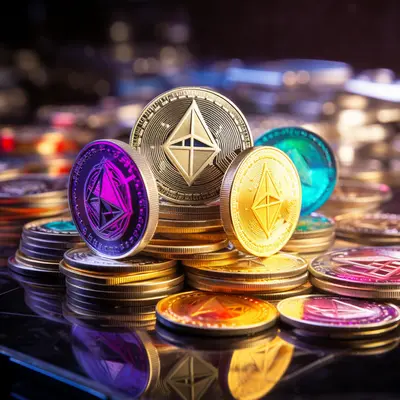Worldcoin Frenzy: Key Considerations Before and After Listing on Trading Platforms
Worldcoin (WLD) Updates: Before, During, and After Going Live
Worldcoin (WLD) Prior to Listing: An Insightful Overview
Worldcoin Retinal Scan Identification Project: A Two-Year Journey to Community Recognition with Three Successful Fundraising Rounds, Totaling $240 Million USD.
Worldcoin (WLD) Listing Event with Sam Alman, OpenAI's CEO, Set for July 24 on Leading Exchanges: Binance, Huobi, OKX, Bybit, and More. Investors Eagerly Anticipate Promising Rewards through Early Adoption of Orb Product. Worldcoin Introduces Orb Eyeball for Identity Verification via Proof of Personhood Mechanism, Enabling Secure Data Storage on the Blockchain.
Worldcoin's Vision: World ID Project as a Global Digital Passport Stored Securely on Users' Phones, Eliminating the Need for Traditional Identifiers like Phone Numbers or Email Addresses.
The World ID project by the Worldcoin team is designed to function as a global digital passport that can be conveniently stored in users' smartphones. With World ID, individuals can verify their identities without the need for traditional identifiers such as phone numbers or email addresses.
While the project holds immense potential, it has not been without controversy, particularly concerning user data security related to the Orb global eyeball.
Nevertheless, Worldcoin remains committed to its mission of addressing income inequality and providing online identity verification, pushing forward amid debates to achieve its goals.
Worldcoin Gains Massive Attention Ahead of Listing with Estimated Fully Diluted Valuation (FDV) Surpassing $20 Billion Across Various Exchanges, According to CoinMarketCap.
The significant FDV displayed by Worldcoin, as updated on CoinMarketCap prior to its listing, showcases the immense interest surrounding this well-funded project with promising technology.
The interest level continues to surge, especially with the news that the project plans to reward early Worldcoin adopters. According to 0xScope, Worldcoin has already started distributing rewards to over 90,000 eligible wallets, with each address receiving a minimum of 25 WLD tokens.
This news brings joy to over 90,000 investors, but it's a disappointment for individuals who minted NFTs on the Zora network. This commemorative NFT has experienced a significant drop in value, plummeting from its initial price of 0.025 ETH after the WLD airdrop announcement. To receive the 25 WLD reward, users simply need to scan their retinas using the Worldcoin's testing application.
At 4:00 PM on July 24th, as observed on Binance exchange, WLD quickly surged, reaching a peak price of $5.29 per token, equivalent to an FDV of over $52 billion.
Following this remarkable milestone, WLD is currently trading at around $3.1 per token. Each individual can receive $75 (with 1 WLD valued at $3) upon successful identity verification through Orb, a substantial sum for residents in low-income countries

For a comprehensive understanding of Worldcoin, investors can find additional information related to the project by referring to the details available here.
Should You FOMO into WLD at this Moment?
As mentioned earlier, WLD is currently trading around $3.1 per token, which is relatively high compared to projects with similar fundraising amounts. Investors need to carefully consider and conduct thorough research before seeking profits from WLD at this time.
With only approximately 1.5% of the total supply allocated to early adopters and market makers, many investors feel apprehensive when looking at WLD's current price. Investor Ash Crypto shares a sense of déjà vu, reminiscent of the ICP project, and advises against investing in Worldcoin.
However, investors should bear in mind that WLD in the market may experience rapid growth due to a significant portion of the total supply being allocated for rewarding Worldcoin users. With the post-listing FDV hype, the project is likely to attract a substantial user base, leading to a surge in token demand in the near future.
Furthermore, investors considering WLD investments should pay attention to Worldcoin's token distribution schedule. According to project information, 7.5 billion tokens will be allocated over the course of the next 10 or 15 years.

Given the current high valuation and FDV, investing in WLD is considered relatively risky by many. If investors still decide to invest in the project, they should allocate their capital wisely to avoid losses and continuously monitor WLD's on-chain information to identify suitable entry points.
Alternatively, for those who desire to own WLD without making direct investments, investors can register for the project's trial waitlist through the World App. Currently, Worldcoin aims to deploy 1,500 Orb global eyeballs worldwide this year, and we hope Vietnam will be included in that list.
What Does Vitalik Say About Worldcoin?
In his blog post, Vitalik Buterin, the co-founder of Ethereum, discusses at length the technology that Worldcoin is currently pursuing. While he supports the development of Proof of Personhood technology, he remains cautiously optimistic about its potential.
Creating an effective and trustworthy system for proof of personhood, especially for users unfamiliar with blockchain technology, seems quite challenging. I have no envy for those trying to accomplish this mission, and it may take years to find an efficient formula.
Vitalik Buterin, Co-founder of Ethereum
In principle, the concept of Proof of Personhood holds great value, but each unique implementation comes with its risks. Additionally, the world's concerns extend beyond just the Worldcoin project, with a focus on other biometric-related projects such as Proof of Humanity, Idena, BrightID, and more. These projects could potentially lead to risks like personal data leaks or coercion by authoritarian governments.
According to Vitalik, Proof of Personhood is valuable because it addresses critical issues like identity fraud, spam, and centralized power. This solution aims to limit user dependency on centralized entities, minimizing the amount of personal information shared. However, if Proof of Personhood fails to address these issues, even decentralized governance could be dominated by wealthy entities and various adversarial factions.
Many prominent applications have addressed verification issues by utilizing government-supported identification systems such as national IDs, passports, or credit cards. However, users may still face potential damages and privacy infringements if these applications become vulnerable to attacks. Proof of Personhood offers a solution to this problem through ZK-SNARK technology, ensuring enhanced privacy and security for users.
While the prospects are promising, alongside the risks of centralization concerning hardware and governance, Vitalik also highlights other security risks of Proof of Personhood:
-
ID Selling: Users might delegate control of their World ID to third parties in exchange for money. Additionally, they could rent out their ID to others for specific purposes.
-
3D Printed Cloning: Users can use AI to create images or 3D printed clones convincing enough to be accepted by Orb global eyeballs. If a group does this, they can generate countless identities.
-
Hacking or Phone Loss: If users' phones get hacked, they could lose their World ID, which would affect the verification aspect of Proof of Personhood.
-
Government Compelled ID Provision: In this scenario, the government could force citizens to provide their ID, granting the central authority access to millions of World IDs.
Regarding solutions for each issue, investors can refer to Vitalik's proposed approaches. However, more importantly, we all need to thoroughly research and understand the project before making any investment or utilizing the product effectively.
According to Vitalik, there is no perfect method for verifying human identity. He suggests having at least three different approaches, each with its own strengths and weaknesses."
Note: To ensure Google SEO compliance, it's essential to provide informative content while incorporating relevant keywords, ensuring readability, and following proper grammar and structure guidelines.

Alongside these developments, the Ethereum co-founder enthusiastically welcomes individuals and developer groups showing increased interest in addressing personal identity verification issues. He views the efforts to develop these methods as successes that the entire community should continue to build upon.
In a world without any Proof of Personhood, numerous risks can arise, where solutions might be dominated by centralized identification, monetary interests, closed groups, or a combination of all three. I am eager to witness further advancements in all Proof of Personhood methods and hope to see diverse approaches converging into a unified whole.
- Vitalik Buterin, Co-founder of Ethereum"
Note: To ensure Google SEO compliance, it's important to provide valuable content while incorporating relevant keywords, maintaining readability, and following proper grammar and structure guidelines.
Jul 26, 2023













